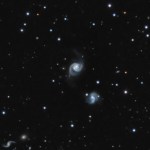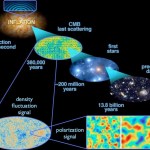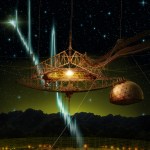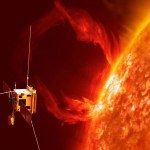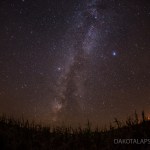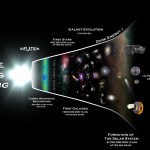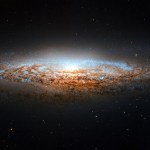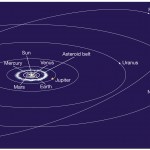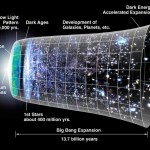Scientific papers
"It’s becoming clear that in a sense the cosmos provides the only laboratory where sufficiently extreme conditions are ever achieved to test new ideas on particle physics. The energies in the Big Bang were far higher than we can ever achieve on Earth. So by looking at evidence for the Big Bang, and by studying things like neutron stars, we are in effect learning something about fundamental physics." -Martin Rees
When the Advanced LIGO detectors turned on in 2015, it shook up the world when they detected their first event: the merger of two quite massive black holes. Since that time, they’ve…
"There's no obvious reason to assume that the very same rare properties that allow for our existence would also provide the best overall setting to make discoveries about the world around us. We don't think this is merely coincidental." -Guillermo Gonzalez
Beginning in 1979, a new idea arose in theoretical physics, seeking to improve upon the idea of the Big Bang: cosmic inflation. Recently, a number of physicists, including one of inflation’s cofounders, Paul Steinhardt, have come out with vitriol against the theory of inflation, calling it not even science. It’s true that inflation may not…
"Just the fact that you so desperately attempt to dismantle our theory proves that we are on the right track. Otherwise you would not feel so threatened by our theories!" -Giogrio Tsoukalos (in a letter to Jason Colavito)
Whenever we detect a signal that we can't immediately explain, it's a very human trait to ascribe our greatest hopes (or fears) to it. In the case of a peculiar radio signal originating from deep space, that means the wildest speculations will involve intelligent aliens. But as much as many of us would hope that such a thing would be true, the physical properties of these…
"How vast those Orbs must be, and how inconsiderable this Earth, the Theatre upon which all our mighty Designs, all our Navigations, and all our Wars are transacted, is when compared to them." -Christiaan Huygens
It was quite a surprise when we started discovering all the exoplanets that were out there. While there’s a big gap between a world like Earth and a world like Uranus or Neptune in our Solar System – 17 times the mass and 4 times the radius – most of the worlds out there fall in between these two types. Super-Earths and Mini-Neptunes are the most common.
The numbers of planets…
"Through basic science literacy, people can understand the policy choices we need to be making. Scientists are not necessarily the greatest communicators, but science and communication is one of the fundamentals we need to address. People are interested." -James Murdoch
Are you scientifically literate? Do you even know what that means? You'll periodically see quizzes designed to assess some measure of science literacy, and they'll usually focus on a slew of general knowledge questions, inevitably decrying what a large fraction of people don't know. But is that a fair assessment of scientific…
"Just to clarify, neither Jason or myself ... are advocating that it is an alien megastructure, but we also can't completely rule it out." -Kimberly Cartier
When we launched the Kepler spacecraft, we expected that we’d be able to measure the light from over 100,000 stars at once, practically continuously, over the timespan of many years. We discovered a number of planets, variable stars and eclipsing binaries, including many of the most Earth-like planets ever. But one star stands out as unique: Tabby’s star.
The flux, including the dips, in KIC 8462852, exhibiting unprecedented dimming and…
"Whenever I found out anything remarkable, I have thought it my duty to put down my discovery on paper, so that all ingenious people might be informed thereof." -Antonie van Leeuwenhoek
We all have our biases, even if we ourselves are scientists. Yet if we want to make quality decisions about the world as we navigate through it, we need to be accurately informed. Without that as the foundation for our decision-making, we’re no better than an ideologue, going with our gut in spite of what the facts might actually indicate.
Many enthusiasts have proposed using an “impossible space engine” for…
"Think about it this way - a boomerang goes out and comes back to you if you throw it. If you throw it out at the universe, it will come back down to you on Earth." -J. B. Smoove
Give a planet a kick, and it goes into a more distant orbit around our star. Give it a hard enough kick, and it will reach escape velocity, leaving our Solar System forever. But if you gave it an almost hard enough kick, it would travel extremely far from the Sun, but it would eventually boomerang back towards the inner Solar System, with potentially disastrous, disruptive consequences. This applies to any…
"Some kind of celestial event. No — no words. No words to describe it. Poetry! They should have sent a poet. So beautiful. So beautiful... I had no idea." -Dr. Ellie Arroway, Contact
Back in 2006, the International Astronomical Union defined the term "planet" for the first time by three criteria: its ability to orbit the Sun, to pull itself into hydrostatic equilibrium, and to clear its orbit. This not only excluded all exoplanets, but it set up impractical criteria for measuring exoplanet properties.
Image credit: ESO.
But UCLA scientist Jean-Luc Margot found a new planetary test…
"On a cosmic scale, our life is insignificant, yet this brief period when we appear in the world is the time in which all meaningful questions arise." -Paul Ricoeur
Ask anyone who's looked up at a dark sky on a clear, moonless night, and you'll immediately hear tales about how incomprehensibly vast the Universe is.
Image credit: Randy Halverson, flickr user dakotalapse, from http://dakotalapse.com/.
But what you're looking at isn't much of the Universe at all. In fact, practically every point of light you see, including the vast swath of stars too dim to individually resolve, comes…
“Faultily faultless, icily regular, splendidly null, dead perfection; no more” -Lord Alfred Tennyson
Ahh, the Standard Model of elementary particles and their interactions. It's right up there with General Relativity -- our theory of gravitation in the Universe -- as the most successful physical theory of all-time.
Image credit: DoE, NSF, LBNL, and CPEP, via http://www.cpepphysics.org/.
While General Relativity describes the relationship between matter-and-energy and spacetime, the Standard Model describes all the known particles in the Universe and how they interact with one another…
"In any case, the number three fitted perfectly the way quarks occur in nature." -Murray Gell-Mann
You might think that we know it all, at least as far as knowing-it-all is possible. After all, we know that matter is made up of atoms, which are made up of electrons and nuclei, and the nuclei are made up of protons and neutrons, and then the protons and neutrons are made up of quarks and gluons.
Image credit: Hyak / Martin Savage, eScience Institute, University of Washington.
Along with the electrons, the quarks and gluons are -- as far as we know -- indivisible, which places them among the…
"From my close observation of writers... they fall into two groups: one, those who bleed copiously and visibly at any bad review, and two, those who bleed copiously and secretly at any bad review." -Isaac Asimov
You'd never know it unless you were one of about six people in the entire world, but today is a landmark anniversary for me. Three years ago, I was on summer break from teaching at my local college, when I got an email from the Royal Astronomical Society in England.
Image credit: Royal Astronomical Society, R102/0155 Herschel's Great Telescope.
The UK-based society at the forefront…
"I prefer to be true to myself, even at the hazard of incurring the ridicule of others, rather than to be false, and to incur my own abhorrence." -Frederick Douglass
I thought we were past this, I really did. Having grown up in New York, having lived in eight different states and traveled to 39 others -- as well as maybe a dozen different countries -- I truly thought there were a few things that were obvious. One of them, of course, is that you've got to give something a shot to know whether you like it or not. Hopefully, no matter who, where, or what you are, you'll enjoy this upbeat song by…
"On what can we now place our hopes of solving the many riddles which still exist as to the origin and composition of cosmic rays?" -Victor Francis Hess
We've come a tremendously long way in our understanding of the Universe, but there are plenty of mysteries still to be revealed. Way back in the late 1800s, we noticed that there was an unaccounted-for excess in the amount of ionization in the upper atmosphere, something that our Sun and Earth, by themselves, couldn't explain.
Victor Francis Hess -- the originator of the quote atop -- decided to go see for himself, and conducted a series of…
"Much later, when I discussed the problem with Einstein, he remarked that the introduction of the cosmological term was the biggest blunder he ever made in his life. But this “blunder,” rejected by Einstein, is still sometimes used by cosmologists even today, and the cosmological constant denoted by the Greek letter Λ rears its ugly head again and again and again." -George Gamow, the father of the Big Bang model
The Big Bang -- the prediction that the Universe started from a hot, dense, rapidly expanding state -- tells us where our cold, star-and-galaxy-rich, slowly expanding Universe full of…
“Hell must be isothermal; for otherwise the resident engineers and physical chemists (of which there must be some) could set up a heat engine to run a refrigerator to cool off a portion of their surroundings to any desired temperature.” -Henry Albert Ben
One of the most amazing ideas to come out of our observations of the Universe over the last century is that our vast, star-filled, mostly-empty Universe hasn't always been like this.
Image credit: Ricky Barnard / Fine Art America.
Today, the Universe is very cold, expanding, and the average distance between galaxies is increasing as time…
"The cosmos is all that is or ever was or ever will be. Our feeblest contemplations of the Cosmos stir us—there is a tingling in the spine, a catch in the voice, a faint sensation, as if a distant memory, or falling from a height. We know we are approaching the greatest of mysteries." -Carl Sagan
If you looked out at the planets in the Solar System orbiting our Sun, you'd expect that if you know where they are right now and how quickly they're moving, you can figure out exactly where they're going to be at any time-and-date arbitrarily far into the future. That's the great power that comes…
"We have been forced to admit for the first time in history not only the possibility of the fact of the growth and decay of the elements of matter. With radium and with uranium we do not see anything but the decay. And yet, somewhere, somehow, it is almost certain that these elements must be continuously forming. They are probably being put together now in the laboratory of the stars." -Robert Millikan
The Universe has been around for a long time, but without the Big Bang, we'd never have any of the matter or starlight that gives rise to practically all of our experiences in the entire…
"Forget it. I didn't have that thing inside me where I wanted to smash against somebody and watch them break. I was too sensitive for that and disliked being that sensitive." -Josh Brolin
How do you figure out what something is made of? You take it apart -- cracking it open if necessary -- and look inside. This is something we've been doing since... well, since before our ancestors were even human.
Images credit: Elisabetta Visalberghi.
For most things here on Earth, that's easy enough. If you wanted to go down to the smallest scales possible, however, it becomes harder and harder to "crack…
